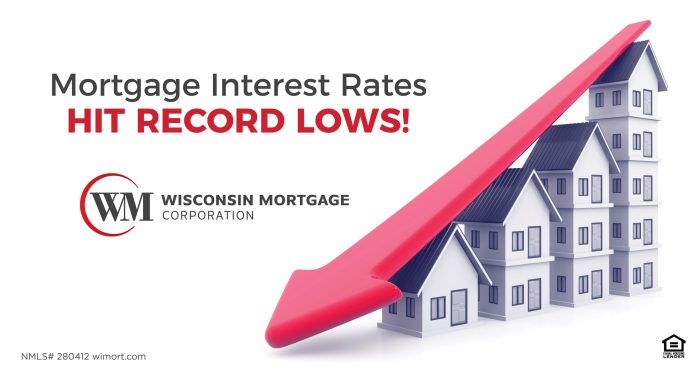Diving into the world of low-interest rate mortgages, we embark on a journey filled with financial possibilities and smart choices. As we navigate through the intricate landscape of mortgage rates, let’s uncover the hidden gems that can lead us to our dream home with favorable terms and conditions.
Exploring the nuances of interest rates and mortgage options, we aim to provide you with a comprehensive guide to make informed decisions in the realm of real estate financing.
What are low-interest rate mortgages?
Low-interest rate mortgages are home loans with a lower interest rate compared to traditional mortgages. These types of mortgages can provide significant savings over the life of the loan.
How do low-interest rate mortgages work?
Low-interest rate mortgages work by offering borrowers a lower interest rate on their home loan, which results in lower monthly payments. This can save borrowers thousands of dollars over the life of the loan compared to higher interest rate mortgages.
Benefits of opting for a low-interest rate mortgage
- Lower monthly payments: With a lower interest rate, borrowers can enjoy reduced monthly payments, freeing up funds for other expenses.
- Long-term savings: By securing a low-interest rate mortgage, borrowers can save a significant amount of money over the life of the loan.
- Increased affordability: Lower interest rates make homeownership more accessible and affordable for many individuals and families.
Eligibility criteria for obtaining a low-interest rate mortgage
- Good credit score: Lenders typically offer low-interest rate mortgages to borrowers with a strong credit history and a high credit score.
- Stable income: Lenders look for borrowers with a stable income to ensure they can make timely mortgage payments.
- Low debt-to-income ratio: A lower debt-to-income ratio indicates that borrowers can comfortably manage their monthly mortgage payments.
Factors influencing low-interest rate mortgages
When it comes to low-interest rate mortgages, there are several key factors that can impact the rates offered to borrowers. Factors such as credit scores and economic conditions play a significant role in determining the interest rates on mortgages.
Credit Scores
Having a good credit score can greatly influence the interest rates offered on mortgages. Borrowers with higher credit scores are seen as less risky by lenders, leading to lower interest rates. On the other hand, borrowers with lower credit scores may be offered higher interest rates to compensate for the perceived risk.
Economic Conditions
The overall economic conditions can also have a major impact on low-interest rate mortgages. When the economy is strong and interest rates are low, borrowers may be able to secure more favorable mortgage rates. Conversely, during times of economic uncertainty or high interest rates, borrowers may face higher rates on their mortgages.
Types of low-interest rate mortgages
When it comes to low-interest rate mortgages, there are several types available in the market to cater to different needs and preferences. Let’s take a closer look at the main options:
Fixed-Rate Mortgages
Fixed-rate mortgages offer a stable interest rate throughout the loan term, providing predictability in monthly payments. Borrowers can lock in a low rate at the beginning, which remains constant even if market rates increase. This type of mortgage is ideal for those who prefer budget certainty and plan to stay in their home for an extended period.
Adjustable-Rate Mortgages
Adjustable-rate mortgages (ARMs) start with a low introductory rate that adjusts periodically based on market conditions. While initial rates are often lower than fixed-rate mortgages, they can fluctuate, leading to potential payment increases or decreases. ARMs are suitable for borrowers who are comfortable with some level of interest rate risk and expect to move or refinance before rate adjustments occur.
Government-Backed Loan Programs
Government-backed loan programs such as FHA loans, VA loans, and USDA loans offer low-interest rate mortgages to eligible borrowers. These programs provide added flexibility and accessibility to individuals who may not qualify for conventional loans. FHA loans, for example, have competitive interest rates and require lower down payments, making homeownership more attainable for first-time buyers or those with limited financial resources.
Tips for obtaining low-interest rate mortgages

When it comes to securing a low-interest rate mortgage, there are several strategies that can help you get the best deal possible. From improving your credit score to negotiating with lenders, these tips can make a significant difference in the interest rate you receive.
Improving Credit Scores
- Pay bills on time: Late payments can negatively impact your credit score, so make sure to pay all your bills on time.
- Reduce debt: Lowering your overall debt can improve your credit utilization ratio, which is a key factor in your credit score.
- Check your credit report: Regularly review your credit report for any errors or discrepancies that could be affecting your score.
Negotiating with Lenders
- Shop around: Get quotes from multiple lenders and use them as leverage when negotiating for a better rate.
- Ask about discounts: Some lenders offer discounts for things like setting up automatic payments or having a high credit score.
- Consider a mortgage broker: A broker can help you find the best rates and terms by working with multiple lenders on your behalf.
Shopping Around
- Compare rates: Don’t settle for the first offer you receive. Compare rates from different lenders to find the best deal.
- Look at different loan types: Consider different loan types, such as fixed-rate or adjustable-rate mortgages, to see which one offers the best rates for your situation.
- Understand the terms: Make sure you fully understand the terms of the mortgage, including any fees or penalties, before signing on the dotted line.